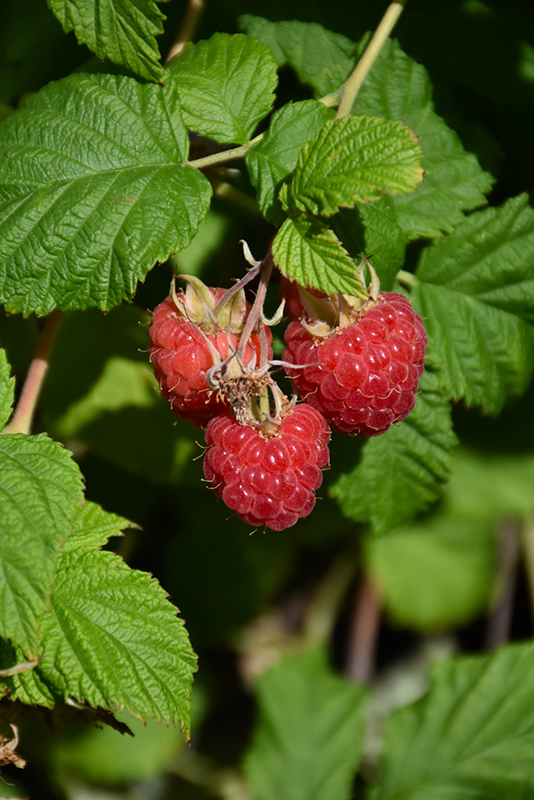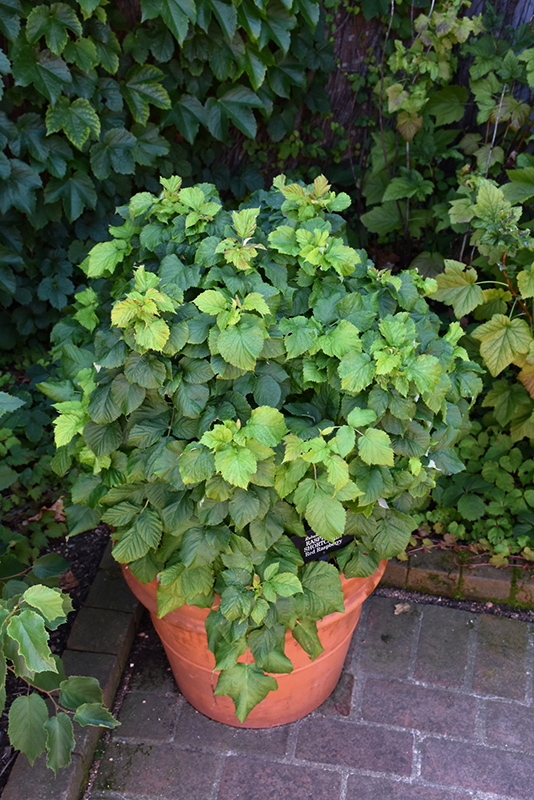Plant Library
Height: 3 feet
Spread: 3 feet
Sunlight:
![]()
Hardiness Zone: 4
Brand: Bushel and Berry
Description:
A smaller variety producing full size red fruit with delicious flavor, and no thorns to deal with; great for containers as well as smaller garden spaces; needs regular pruning and protection from birds
Edible Qualities
Raspberry Shortcake® Raspberry is a small shrub that is commonly grown for its edible qualities. It produces red heart-shaped berries which are usually ready for picking in mid summer. The berries have a sweet taste.
The berries are most often used in the following ways:
- Fresh Eating
- Cooking
- Baking
- Preserves
- Canning
- Freezing
Features & Attributes
Raspberry Shortcake® Raspberry has rich green deciduous foliage on a plant with an upright spreading habit of growth. The textured oval compound leaves do not develop any appreciable fall color. It features an abundance of magnificent red berries in mid summer.
This is an open multi-stemmed deciduous shrub with an upright spreading habit of growth. Its relatively coarse texture can be used to stand it apart from other landscape plants with finer foliage. This is a high maintenance plant that will require regular care and upkeep. Each spring, cut back all dead and two-year old canes to the ground, leaving only last year's growth standing. It is a good choice for attracting birds to your yard. Gardeners should be aware of the following characteristic(s) that may warrant special consideration;
- Suckering
- Disease
Aside from its primary use as an edible, Raspberry Shortcake® Raspberry is sutiable for the following landscape applications;
- Mass Planting
- Naturalizing And Woodland Gardens
- Orchard/Edible Landscaping
- Container Planting
Planting & Growing
Raspberry Shortcake® Raspberry will grow to be about 3 feet tall at maturity, with a spread of 3 feet. It tends to be a little leggy, with a typical clearance of 1 foot from the ground. It grows at a fast rate, and under ideal conditions can be expected to live for approximately 10 years. This is a self-pollinating variety, so it doesn't require a second plant nearby to set fruit.
This shrub may not always play well with others; as such, it is best grown in its own designated garden space or isolated area of an edibles garden. It should only be grown in full sunlight. It prefers to grow in average to moist conditions, and shouldn't be allowed to dry out. It is not particular as to soil type or pH. It is somewhat tolerant of urban pollution. This particular variety is an interspecific hybrid. It can be propagated by division; however, as a cultivated variety, be aware that it may be subject to certain restrictions or prohibitions on propagation.
Raspberry Shortcake® Raspberry is a good choice for the edible garden, but it is also well-suited for use in outdoor pots and containers. With its upright habit of growth, it is best suited for use as a 'thriller' in the 'spiller-thriller-filler' container combination; plant it near the center of the pot, surrounded by smaller plants and those that spill over the edges. It is even sizeable enough that it can be grown alone in a suitable container. Note that when grown in a container, it may not perform exactly as indicated on the tag - this is to be expected. Also note that when growing plants in outdoor containers and baskets, they may require more frequent waterings than they would in the yard or garden. Be aware that in our climate, most plants cannot be expected to survive the winter if left in containers outdoors, and this plant is no exception. Contact our experts for more information on how to protect it over the winter months.
Disclaimer - This Plant Finder tool is an online resource representing many of the varieties that we carry over the course of the season, and is intended for informational purposes only. Inventory varies seasonally, so we cannot guarantee that every plant will be in stock at all times - please contact the store directly for availability. It does not include our entire inventory of plants, so be sure to visit our store to see varieties that may not be represented on this list.




